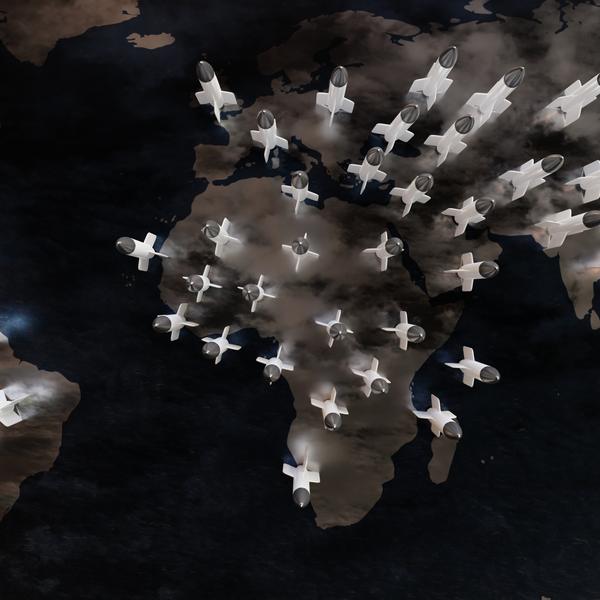Like 9/11, the raid on Israel by the paramilitary wing of Hamas on October 7 is frequently held to be a game changer — an “inflection point.” But, like 9/11, it seems instead to have been a desperate foray by an increasingly irrelevant group that got horribly lucky.
After the attack, many in the United States, including President Joe Biden, urged the Israelis not to repeat the mistakes the U.S. made after 9/11. Those mistakes included exaggerating the strategic significance of the terrible event and of the capacities of those perpetrating it, and then understandably but counterproductively reacting in anger to the provocation in a manner that resulted in far more damage than the initiating event and created far more dedicated enemies than had existed before.
9/11
The 9/11 attack was horrific — indeed, scarcely any terrorist act in history, in war zones or outside them, has inflicted even ten percent as much total destruction.
However, although the attacks were in many respects clever and well planned, their success was more the result of luck than of ingenuity. Before 9/11, al-Qaeda, a fringe group at the time, had launched several terrorist attacks, but even those that succeeded were laced with screw-ups, and there were many missteps in the execution of the 9/11 plot — participants took unauthorized foreign trips, failed to get trained, and loudly bragged about how they would soon be famous.
In fact, it is not at all clear that the planners truly appreciated how successful they would be or why. Indeed, the 9/11 planners had been working on a “second wave” of hijackings, suggesting they were oblivious to the fact that the first attack would make a “second wave” vastly more difficult, and likely impossible because, as pilot Patrick Smith points out, “Any hijacker would face a planeload of angry and frightened people ready to fight back.”
Despite widespread fears (including that the group would get nuclear weapons), al-Qaeda central proved to be unable to do much of anything after 2001 except to issue videos full of sound and fury. Even under siege, it is difficult to see why it could not have organized attacks at least as costly and shocking as the shooting rampages (organized by different extremist group, Lashkar-e-Taiba) that took place in Mumbai, India in 2008.
Nonetheless, the United States, often envisioning the group to pose an existential threat, reacted by launching two unnecessary wars that led to more than 100 times the number of deaths (including twice as many American ones) than the impelling event. The wars also served to motivate a generation of dedicated enemies. Overwhelmingly, for example, Islamist terrorists in the U.S. after 9/11 were motivated not by any sort of ideological “radicalization,” but rather by an intense hostility to U.S. military activities in the Middle East which they saw as a murderous effort to destroy Islam. And others abroad were generated by, and drawn to, America’s new occupations.
10/7
Direct wars between Israel and neighboring states have substantially subsided. There were four of these between 1948 and 1973, but none in the last half-century. Instead, a number of key Arab states have made their peace with Israel, albeit sometimes grudgingly, starting with Egypt, then Jordan, and more recently with the Abraham Accords states, which might even have come to include Saudi Arabia.
As present events make all too dramatically clear, Israel still has to deal with substate paramilitary groups like Hamas in Gaza. But increasingly, international pressure on such groups had been building, effectively urging them to get a life, to stop bashing their heads against the Israeli rock, and to get used to coexistence—a message rejected by many outraged Palestinians.
Hamas, in particular, also seemed to have been losing support among Palestinians. Polls conducted before its October 7 raid into Israel suggest that majorities in Gaza and the West Bank had come to be put off by its incompetence and corruption and did not support its eliminationist agenda for Israel.
The destructiveness of the raid itself, like 9/11, was due more to luck than to adept planning and seems to have surprised even the perpetrators. As it happened, Israel’s defenses on the Gaza border were undermanned, out of position, poorly organized, and operating under the conclusion that Hamas was neither interested in nor capable of launching such an invasion. About half of the soldiers were away, and just two days earlier the Israelis had transferred two commando companies to the West Bank. Moreover, the music festival where Hamas found half of its civilian victims had continued past its scheduled end the day before.
Intelligence obviously underestimated the ability of Hamas to breach Israel’s security fence and to rampage in the area for some time. However, the attack failed if, as some have suggested, Hamas’s goals were broader — to inspire Palestinians and Arab populations to rise up or to even take over Israeli cities and storm military bases. The raiders did manage to take over all or parts of an important nearby military base at Re’im, but they were pushed out in a few hours.
On the other hand, if Hamas’s goal was, as one of its leaders put it, simply to show that it still exists and that its interests “must remain on the table,” the group can claim a degree of success. And if the raid was motivated importantly by a desire to rally Palestinians to Hamas’s cause and to stall or reverse the Abraham Accords process, Israel’s outraged overreaction has played into Hamas’s hands.
9/11, 10/7, and the future
Whatever the plans and justifications, the Israeli military is now fully alerted to the danger, and any repetition will be much less effective and consequential. That is, like 9/11, the attack is more likely to prove to be an aberration than a harbinger. Apparently without really knowing it, Hamas exploited an opening, but that condition is unlikely to be repeated.
Like the United States after 9/11, Israel enjoyed worldwide sympathy at first. But, ignoring American advice derived from its disastrous 9/11 experience, that sympathy has eroded as Israel propels itself into a massively destructive effort to “eliminate” an extremist group with limited capabilities. That effort has thus far resulted in upwards of 20 times more civilian deaths than the attack on Israel, and it is, as U.S. Secretary of Defense Lloyd Austin suggests, essentially based on “irresponsible rhetoric.” And, as he further notes, if you drive civilians “into the arms of the enemy, you replace a tactical victory with a strategic defeat.”
That outcome seems to be in the cards as Palestinians’ support for Hamas grows and as governments in the area, under intense pressure from their citizenries, rally once more behind the Palestinian cause. In particular, the Israeli overreaction could lead to the creation of a generation or more of fighters (many of them currently children) who are bitterly determined to exact revenge against Israel. Like the destructive American overreaction to 9/11, the Israeli one after 10/7 may be, as many contend, in some sense immoral. But it may also prove to be profoundly stupid.
















